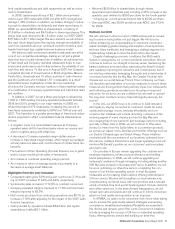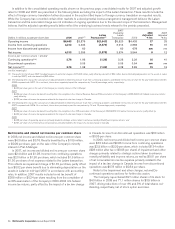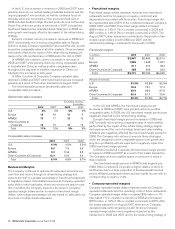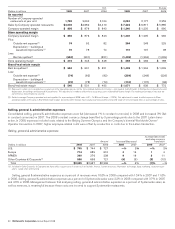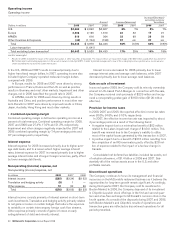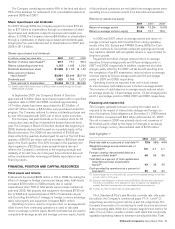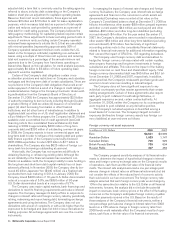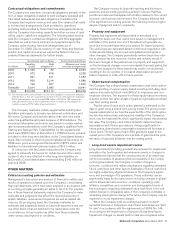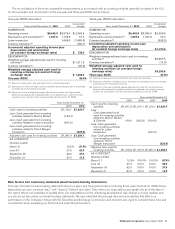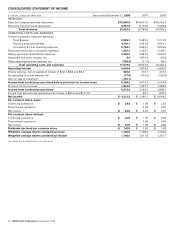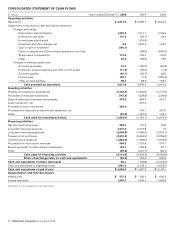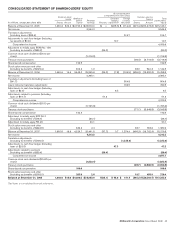McDonalds 2008 Annual Report Download - page 35
Download and view the complete annual report
Please find page 35 of the 2008 McDonalds annual report below. You can navigate through the pages in the report by either clicking on the pages listed below, or by using the keyword search tool below to find specific information within the annual report.In connection with the Company’s sale of its investment in
Boston Market in August 2007, the Company received proceeds
of approximately $250 million and recorded a gain of $69 million
after tax. In addition, Boston Market’s net income (loss) for 2007
and 2006 was ($9) million and $7 million, respectively.
In first quarter 2006, Chipotle completed an IPO of 6.1 million
shares resulting in a tax-free gain to McDonald’s of $32 million to
reflect an increase in the carrying value of the Company’s invest-
ment as a result of Chipotle selling shares in the public offering.
Concurrent with the IPO, McDonald’s sold 3.0 million Chipotle
shares, resulting in net proceeds to the Company of $61 million
and an additional gain of $14 million after tax. In second quarter
2006, McDonald’s sold an additional 4.5 million Chipotle shares,
resulting in net proceeds to the Company of $267 million and a
gain of $128 million after tax, while still retaining majority owner-
ship. In fourth quarter 2006, the Company completely separated
from Chipotle through a noncash, tax-free exchange of its remain-
ing Chipotle shares for its common stock. McDonald’s accepted
18.6 million shares of its common stock in exchange for the
16.5 million shares of Chipotle class B common stock held by
McDonald’s and recorded a tax-free gain of $480 million.
Chipotle’s net income for 2006 was $18 million.
Accounting changes
• SFAS Statement No. 158
In 2006, the Financial Accounting Standards Board (FASB) issued
Statement of Financial Accounting Standards No. 158, Employers’
Accounting for Defined Benefit Pension and Other Postretirement
Plans,an amendment of FASB Statements No. 87, 88, 106 and
132(R) (SFAS No. 158). SFAS No. 158 requires the Company to
recognize the overfunded or underfunded status of a defined
benefit postretirement plan as an asset or liability on the Con-
solidated balance sheet and to recognize changes in that funded
status in the year changes occur through accumulated other
comprehensive income. The Company adopted the applicable
provisions of SFAS No. 158 effective December 31, 2006, as
required. This resulted in a net decrease to accumulated other
comprehensive income of $89 million, for a limited number of
applicable international markets.
• EITF Issue 06-2
In 2006, the FASB ratified Emerging Issues Task Force (EITF)
Issue 06-2, Accounting for Sabbatical Leave and Other Similar
Benefits Pursuant to FASB Statement No. 43, Accounting for
Compensated Absences (EITF 06-2). Under EITF 06-2,
compensation costs associated with a sabbatical should be
accrued over the requisite service period, assuming certain con-
ditions are met. Previously, the Company expensed sabbatical
costs as incurred. The Company adopted EITF 06-2 effective
January 1, 2007, as required and accordingly, recorded a $36 mil-
lion cumulative adjustment, net of tax, to decrease the
January 1, 2007 balance of retained earnings. The annual impact
to earnings is not significant.
• FASB Interpretation No. 48
In 2006, the FASB issued Interpretation No. 48, Accounting for
Uncertainty in Income Taxes (FIN 48), which is an interpretation of
FASB Statement No. 109, Accounting for Income Taxes. FIN 48
clarifies the accounting for income taxes by prescribing the mini-
mum recognition threshold a tax position is required to meet
before being recognized in the financial statements. FIN 48 also
provides guidance on derecognition, measurement, classification,
interest and penalties, accounting in interim periods, disclosure and
transition. The Company adopted the provisions of FIN 48 effec-
tive January 1, 2007, as required. As a result of the
implementation of FIN 48, the Company recorded a $20 million
cumulative adjustment to increase the January 1, 2007 balance of
retained earnings. FIN 48 requires that a liability associated with
an unrecognized tax benefit be classified as a long-term liability
except for the amount for which cash payment is anticipated within
one year. Upon adoption of FIN 48, $339 million of tax liabilities,
net of deposits, were reclassified from current to long-term and
included in other long-term liabilities.
• SFAS Statement No. 157
In 2006, the FASB issued Statement of Financial Accounting Stan-
dards No. 157, Fair Value Measurements (SFAS No. 157). SFAS
No. 157 defines fair value, establishes a framework for measuring
fair value, and expands disclosures about fair value measurements.
This statement does not require any new fair value measurements;
rather, it applies to other accounting pronouncements that require
or permit fair value measurements. The provisions of SFAS
No. 157, as issued, were effective January 1, 2008. However, in
February 2008, the FASB issued FASB Staff Position No. FAS
157-2, Effective Date of FASB Statement No. 157, which allows
entities to defer the effective date of SFAS No. 157, for one year,
for certain non-financial assets and non-financial liabilities, except
those that are recognized or disclosed at fair value in the financial
statements on a recurring basis (i.e., at least annually). The Com-
pany adopted SFAS No. 157 as of January 1, 2008 and elected
the deferral for non-financial assets and liabilities. The effect of
adopting this standard was not significant, and we do not expect
the January 1, 2009 adoption of SFAS No. 157 for non-financial
assets and liabilities to have a significant impact on our con-
solidated financial statements.
• SFAS Statement No. 141(R)
In 2007, the FASB issued Statement of Financial Accounting
Standards No. 141(R), Business Combinations (SFAS No. 141(R)).
SFAS No. 141(R) requires the acquiring entity in a business
combination to record all assets acquired and liabilities assumed at
their respective acquisition-date fair values, changes the recog-
nition of assets acquired and liabilities assumed arising from
preacquisition contingencies, and requires the expensing of
acquisition-related costs as incurred. SFAS No. 141(R) applies
prospectively to business combinations for which the acquisition
date is on or after January 1, 2009. We do not expect the adoption
of SFAS No. 141(R) to have a significant impact on our con-
solidated financial statements.
• SFAS Statement No. 160
In 2007, the FASB issued Statement of Financial Accounting
Standards No. 160, Noncontrolling Interests in Consolidated Finan-
cial Statements (an amendment of Accounting Research Bulletin
No. 51 (ARB 51)) (SFAS No. 160). SFAS No. 160 amends ARB
51 to establish accounting and reporting standards for the non-
controlling interest in a subsidiary and for the deconsolidation of a
subsidiary. SFAS No. 160 becomes effective beginning
January 1, 2009 and is required to be adopted prospectively,
except for the reclassification of noncontrolling interests to equity
and the recasting of net income (loss) attributable to both the con-
trolling and noncontrolling interests, which are required to be
McDonald’s Corporation Annual Report 2008 33


